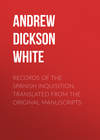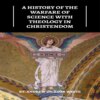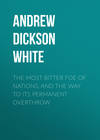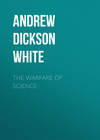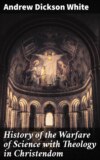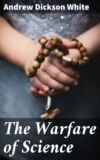Czytaj książkę: «Records of the Spanish Inquisition, Translated from the Original Manuscripts», strona 6
The prisoner then being exhorted to bethink himself and declare the truth, was remanded to prison, which I, the abovementioned Secretary certify.
Before me—
Miguel Rodriguez.
AUDIENCE FOR PUBLICATION
In the Royal Palace of the Inquisition of Barcelona, on the seventeenth day of June, one thousand six hundred and thirtyseven, the Inquisitor, Dr Domingo Abbad y Huerta presiding sole in his morning audience, ordered the abovementioned Leonardo Phelipe to be brought out of prison; which being done, he was
Questioned, if he remembered anything relating to his affair, which he was bound by his oath to divulge.
Answered, that he had nothing more to say.
He was then informed that the Promotor Fiscal of this Holy Office was about to demand publication of the testimony against him, before which it would be well for him to confess the whole truth, by which means his trial should be despatched with all brevity and mercy.
Answered, that he had nothing more to say.
Straightway appeared the Secretary, Mattheo Magre, who officiated as Fiscal, and requested publication of the testimony against the said Leonardo Phelipe according to the style of the Holy Office. The Inquisitor then ordered the said publication to be made, concealing the names and other circumstances of the witnesses which might lead to a discovery of their persons, according to the instructions and style of the Holy Office.
[Here follows the publication, and the answers of the prisoner, corresponding with what has already been given.]
The Inquisitor then directed him to be furnished with a copy of the above publication, that he might, with the assistance of his counsel, reply thereto on the third day. Whereupon being admonished to bethink himself and declare the truth, he was remanded to prison.
Before me—
Miguel Rodriguez.
AUDIENCE TO COMMUNICATE THE PUBLICATION
In the Royal Palace of the Inquisition of Barcelona, on the twentysecond day of June, one thousand six hundred and thirty seven, the Inquisitor, Dr Domingo Abbad y Huerta presiding sole in his morning audience, ordered the above Leonardo Phelipe to be brought out of prison; which being done, he was
Questioned, if he remembered anything relating to his affair, which he was bound by his oath to divulge.
Answered, that by reason of the troubles which arose in his house, he had sometimes broken out into swearing, saying, ‘the devil take me if this is not true.’
He was then informed that Dr Francisco Magrinya, his advocate was present, with whom he might communicate respecting the publication, and other matters of his defence. The publication and the answers of the prisoner, &c. were then read to the said Dr Francisco Magrinya, who drew up articles of defence upon a paper prepared by the Secretary. Here the audience closed, and the prisoner being admonished to bethink himself, was remanded to prison.
Before me—
Miguel Rodriguez.
AUDIENCE FOR THE DEFENCE
In the Royal Palace of the Inquisition of Barcelona, on the twentyfifth day of June, one thousand six hundred and thirtyseven, the Inquisitor, Dr Domingo Abbad y Huerta presiding sole in his morning audience, ordered the above Leonardo Phelipe to be brought out of prison; which being done, he was
Questioned, if he remembered anything relating to his affair, which he was bound by his oath to divulge.
Answered, that he had nothing more to say.
He was then informed that Dr Francisco Magrinya, his advocate, was present, and had arranged his defence, which he might examine. The said Dr Francisco Magrinya then read to him certain articles which he had drawn up in his favor, and this having been heard by the prisoner, he declared that he made a presentation of the same, and requested an examination of the witnesses named in the margin, and that the other investigations referred to might be made.
DEFENCE
MOST ILLUSTRIOUS SIR—
Although Bernardo Phelippe, an inhabitant of the city of Tarragona has no necessity for any defence against the charges of the Promoter Fiscal of this Holy Office, yet the more clearly to show his innocence, and premising expressly that what he declares against the witnesses is not with an intention to injure or defame them, but solely to defend himself, onere superflux probationis rejecto, he offers the following:—
1. It is not true that he has abjured, sworn or blasphemed the head of God, or uttered any other blasphemies, which statement is the truth.
2. It is not true that he has neglected to hear mass on the Sundays and holidays appointed, or neglected to confess and take the sacrament every year, or been excommunicated on such account; which is the truth.
3. The witnesses who depose against him, turn all his oaths into swearing, ‘by the head of God,’ which is the truth.
4. Even though, (quod expresse negat) he may have at sometimes sworn ‘by the head of God,’ yet it was done in the heat of passion, and inasmuch as de jure prima motus non sit in homine, nothing bad can be imputed to him, which is the truth.
5. In addition to this, the above witnesses are single witnesses, disagree among themselves, and are not deserving of credit, inasmuch as non det fides testibus singularibus, which is the truth.
6. The prisoner, although a Frenchman, is still a good Christian, and not at all of suspicious faith. He hears mass on the Sundays and holidays appointed, as many can testify who have seen him; which is the truth.
7. He also confesses and takes the sacrament every year at Easter, and other times at the hands of the Guardian of the Convent of St Francisco and the Sacristan, as may be seen by his certificate of confession given at the last Lent, and which he now presents as a testimonial in his favor solely; which is the truth.
8. There is also the same reason for believing that he has confessed on every Easter, as can be seen by the books of confession kept by the Curates; which is the truth.
9. He who states one falsehood is not to be believed in any other assertion, and inasmuch as the witnesses against the prisoner affirmed that he did not confess throughout the year, but was excommunicated, and declared so, for not complying with the ordinances, and that he did not wear a rosary, all which has been shown to be false by his certificate, and the rosary found upon him; for this reason they cannot be believed, when they state that he does not hear mass, and that he swears and blasphemes; which is the truth.
10. The prisoner suspects that one of the witnesses against him is a young man of about twenty years of age, and a mortal enemy of the prisoner. This, added to the circumstance of his being a minor, should cause his testimony to be rejected; which is the truth.
11. The testimony of the other witness also should be rejected, as he supposes this person to be his wife, who leads a quarrelsome life with him, and bears him great enmity; which is the truth.
12. The prisoner supposes that the cause of the misfortune in which he now finds himself, is, his having given his wife a good beating on the festival of the Resurrection, on which account she probably has directed her malice against him, and suborned the other witnesses; which is the truth.
13. The same hatred is borne against him by Joseph Lleonart, his son, on account of the prisoner’s having pawned an anvil, at which his son was displeased; which is the truth.
14. The said Bernardo Phelippe is reputed throughout all the city of Tarragona to be an honest man and a good Christian, attending mass at the church with much punctuality on the days appointed, and confessing and taking the sacrament at the proper time, as proved by his certificate; which is the truth.
15. The said Bernardo Phelippe has never been imprisoned or punished by this or any other tribunal; which is the truth.
16. From all which it appears that the said Phelippe is free from all the offences charged upon him, and ought to be absolved and released from the prison in which he is confined, experiencing mercy, which also would be justice, vel alias omni meliori modo quod de jure sibi adaptari valeat, et verum.
17. Ponit quod omnia et singula sunt vera, super quibus jus diei et justitiam ministrari postulat, et verun.
F. Magrinya.
The Inquisitor ordered the above to be placed among the proceedings of the trial, and declared that he was ready to make the necessary investigations. Whereupon the prisoner, being admonished, was remanded to prison.
Before me—
Miguel Rodriguez.
TO THE CANON JOAN FERRER, COMMISSARY
Leonardo Phelipe, needlemaker, an inhabitant of this city, and now in the secret prison of this Holy Office, on account of an action brought against him by the Licentiate Don Andres Panyagua, Fiscal of this Inquisition, has presented in his defence the following articles or interrogatives, namely—
1. That the said Leonardo Phelipe, although a Frenchman, yet is a good Christian, and not in anything to be suspected of Lutheranism or any other heresy; that as such, he hears mass every Sunday and holiday prescribed, as can be proved by many witnesses.
2. That he also confesses and takes the sacrament every year, at Easter and other times, as can be shown by his certificate of confession received during last Lent, and which he exhibits in his defence.
3. That the wife of the said Leonardo Phelipe treats him badly, and bears him great hatred, and has brought him into this trouble because he gave her a good beating on the festival of the Resurrection last, which greatly increased her hatred towards him.
4. That the same enmity is borne towards him by Joseph Leonardo, his son, with whom he had an altercation on account of his having pawned an anvil against the inclination of his son, for which reason he concerted with his mother this proceeding against the prisoner.
5. That the said Leonardo Phelipe is reputed throughout all the city of Tarragona to be an honest man, and a good Christian, attending church punctually to hear mass on the days appointed, and confessing and taking the sacrament at the proper times.
On which account you will, on the reception of this, proceed to collect information respecting the matter contained in the above interrogatives, in favor of the said Leonardo Phelipe, examining the witnesses named in the margin opposite each article, which is to be done in the presence of the Notary, with the other legal formalities, and according to the printed formula held by the commissaries. You will also take a copy of the register in the church records referred to in the second article. All which being done, you will forward the proceedings, sealed, with all brevity to our hands.
For the above undertaking we grant you full power and commission in form. God preserve you.
Dr Domingo Abbad y Huerta.
The Inquisitor presiding alone.
Miguel Rodriguez.
Barcelona, June 25th, 1637.
In the city of Tarragona, on the eighteenth day of July, one thousand six hundred and thirtyseven, before the illustrious Juan Ferrer, Presbyter Canon of the Holy Church of Tarragona, Commissary of the Holy Office of the Inquisition, and by particular commission from the most illustrious Inquisitors Apostolical of the Principality of Catalonia, appeared according to summons, and swore formally to declare the truth, a person calling himself Father Pablo Morer, Guardian of the Monastery and Convent of St Francisco in Tarragona, of age, as he stated, fortysix years or thereabout.
Questioned, if he knew or conjectured the cause of his being summoned to appear.
Answered, No.
Questioned, if any one had attempted to persuade him to speak in favor of any person imprisoned by the Holy Office.
Answered, No.
Questioned, if he knew the Fiscal of the Holy Office, or Leonardo Felipe of the city of Tarragona imprisoned by the Holy Office of the Inquisition.
Answered, that he knew neither of them.
He was then informed that the said Felipe presented him as a witness in his defence, in a case brought against him by the Fiscal of the Holy Office. He was directed to give attention while certain questions were put to him, and declare the whole truth.
To the second question he answered that he knew nothing of the matter, respecting which he was questioned, as he was not acquainted with the person. To the last question, he answered that what he had stated was the truth, and it being read, was declared by him to be correctly recorded. He promised secrecy and signed his name.
Pablo Morer.
Before me—
Miguel Gibert, Not’y of Tarragona.
In the city of Tarragona, on the day, month, and year above specified, before the illustrious Juan Ferrer, Presbyter, Commissary, &c. appeared according to summons and swore to declare the truth, a person calling himself Father Nicholas Gil, of the convent of St Francisco in this city, of age, as he stated, fortyfour years or thereabout.
Questioned, if he knew or conjectured the cause of his being summoned to appear.
Answered, No.
Questioned, if any one had attempted to persuade him to speak in favor of any person imprisoned by the Holy Office.
Answered, No.
Questioned, if he knew the Fiscal of the Holy Office, or Leonardo Felipe, needlemaker, of this city, now in imprisonment by the Holy Office.
Answered, that he had no knowledge of the Fiscal, but knew the said Leonardo Felipe, and had held dealings with him.
He was then informed that the abovementioned Leonardo Felipe presented him as a witness in a case brought against him by the said Fiscal. He was directed to give attention while certain questions were put to him, and declare the whole truth.
To the second question, he answered that he remembered to have heard the confession of the said Leonardo Felipe once only during last Lent, but could not remember whether he gave him a certificate or not.
The above is the truth according to the oath of the deponent, and having been read, was declared by him to be correctly recorded. He promised secrecy and signed his name
Pr. Nicola Gil.
Before me—
Miguel Gibert, Not’y Public of Tarragona.
[Here follow the depositions in the same form with the preceding, of various other witnesses in favor of the prisoner, relating to matters alleged by him in his defence.]
AUDIENCE FOR CONCLUDING THE TRIAL
In the Royal Palace of the Inquisition of Barcelona, on the twentyseventh day of June, one thousand six hundred and thirtyseven, the Inquisitors, Dr Domingo Abbad y Huerta and the Licentiate Don Blas Alexandra de Lezaeta presiding in their afternoon audience, ordered the abovementioned Leonardo Phelipe to be brought out of prison, which being done, he was
Questioned, if he remembered anything which he was bound by his oath to declare.
Answered, that he had nothing more to say.
Dr Francisco Magrinya, the prisoner’s advocate, being present, he was informed that the investigations requested by him, had been made, and if he wished the cause to be decided, it should be done, or if he wished other measures to be taken, to state them, and all should be done which justice permitted. Whereupon the said Leonardo Phelipe, by the advice of his counsel, answered that he concluded definitively, and begged a merciful sentence.
The Inquisitors then ordered the same to be notified to the Promoter Fiscal of this Holy Office, in order that a conclusion might be made on the third day. Whereupon the prisoner was remanded to prison.
Before me—
Miguel Rodriguez.
The above order for conclusion was forthwith notified to the Licentiate Don Andres Paniagua, Fiscal, by me, the Secretary,
Rodriguez.
SENTENCE
In the Royal Palace of the Inquisition of Barcelona, on the twentyeighth day of July, one thousand six hundred and thirtyseven, the inquisitors, Dr Domingo Abbad y Huerta, and the Licentiate Don Blas Alexandre de Lezaeta presiding in their morning audience, (the Ordinary not attending by reason of the Cabildo of Tarragona having neglected to appoint one to this office sede vacante, although notified to this end, and the term of eight days having expired) having examined the proceedings carried on in the Holy Office against Leonardo Phelipe, a Frenchman by birth, and a needlemaker by occupation, a native of the village of Agullon, in the bishopric of Genes, and an inhabitant of the city of Tarragona, now in the secret prison of this Holy Office,—
Ordered, unanimously, that this trial, without any other sentence, be suspended, and remain as it is at present.
Before me—
Miguel Rodriguez, Sec’y.
TRIAL OF DON ANTONIO ADORNO, FOR NECROMANTICAL PRACTICES
In the city of Valencia, on the thirteenth day of April, one thousand seven hundred and fiftysix, before Dr Lorenzo Ballester, Presbyter, Confessor to the secret prison of the Holy Office, and before the Extraordinary Commissary for this investigation, appeared voluntarily, and made oath to declare the truth, and preserve secrecy, a person calling himself Joaquim Gil, scrivener, residing in the house of Felipe Matheu in the Calle del Mar of this city, a native of Puebla de Arenoso, in this archbishopric, of age, as he stated, twentyfour years.
Questioned, why he had demanded an audience.
Answered, that it was for the purpose of giving information to the Holy Office respecting a certain soldier of the regiment of Asturias in the garrison of this city. This person was called Don Antonio, and was by birth a Neapolitan, a robust, middle sized man, with a dark complexion, and about twentyfour or twentyfive years of age, which was all the description the deponent could give. On the evening of the eleventh of the present month, the deponent and the abovementioned Felipe Matheu were in company with five soldiers at the house of the said Matheu. Among these was the abovenamed Don Antonio, and this person declared in conversation with the deponent that he possessed the faculty of discovering the thief when a thing was stolen. This he had performed in the following manner. On a certain occasion one of his friends was lamenting the loss of some money which had been stolen from him, when he, the said Don Antonio, replied, that he would discover the thief. He then wrote the names of all the persons present upon separate pieces of paper, and threw them into the fire. Those which contained the names of the innocent were consumed, but the one containing that of the thief remained. Nobody was able to take this out of the fire except Don Antonio. The paper was kept from consuming by the power of the words Christo Señor Nuestro, uttered by him, and it was drawn out from among the coals by the help of this expression; ‘Ego sum. Factus est homo. Consummatum est.’ Besides this he knew another way of practising this divination; and this was to collect the ashes made by the papers, and rub them on the back of his hand, where they would leave marked the name of the thief. Furthermore he stated that he possessed another method of accomplishing this purpose, but this he did not explain.
This conversation having been heard by the abovementioned Felipe Matheu, he rebuked Don Antonio, and this last replied that what he had done he would repeat even before the Inquisitors, or, if that was of any consequence, after communion, inasmuch as he used the words which had been uttered by Christ. Proceeding in the conversation with the deponent, he told him that he had some instruments in his pocket which were useful for many things. He then drew from his right pocket a paper folded up and containing two or three coils of something which the deponent did not see distinctly, on account of the darkness, but felt and handled them. The deponent asked Don Antonio where he had obtained the above knowledge. He replied that he had got it by studying a book of magic which he possessed; that he had learned from this the secret of making himself invisible, and also to render a man invulnerable to thrusts with a sword, a trial of which last he would make upon a dog or cat and show the efficacy of it. The deponent asked him if he knew any secrets relative to playing at ball. He answered that he did not remember any at present, but would make some researches and call upon the deponent at his house, when he would teach him a secret to gain the favor of the ladies. This was agreed to, and the deponent described the house to him. He offered him money if he would discover all his arts, which he did for the purpose of laying the whole before the Holy Office for the benefit of the Catholic Faith.
Questioned, if any other persons heard the above conversation, or knew anything relating to it.
Answered, that the abovementioned Felipe Matheu heard a great part of it, as also Joseph Masquef, scrivener, who lived in the same house, Joseph Jordan, a servant, and two Alguacils, a father and son, who were in the company, and whose names he did not know.
Questioned, if he had made this declaration out of any malice which he bore to the said Don Antonio.
Answered, that he had made it solely from the impulse of his conscience, and because he believed the above things were contrary to our Holy Faith. He affirmed that the whole was the truth, promised secrecy, and signed his name.
Joaquim Gil.
Before me—
Dr Joseph Montes,Presbyter Notary of the Holy Office.
In the city of Valencia, on the seventeenth day of April, one thousand seven hundred and fiftysix, before Dr Lorenzo Ballester, Confessor to the secret prison of the Holy Office and Extraordinary Commissary for this investigation, appeared voluntarily and made oath to declare the truth, and preserve secrecy, Joaquim Gil, &c.
Questioned, why he had demanded an audience.
Answered, on account of the declaration made by him before the present Commissary respecting a certain Don Antonio, of the company of Don Jorge Duran, in the regiment of Asturias. This man, in addition to the peculiarities of his person before described, had a scar above his left eyebrow, apparently the effect of a wound, and a dint of the size of a filbert in the top of his forehead, with black and rather short hair. He came to the house of the deponent on the fifteenth of this month according to agreement, and after some conversation gave him a strip of parchment, about a finger’s breadth wide and above a span long, this was slit through the middle lengthwise and had written on it the following words. ‘Ego + sum. Exe + homo consummatum est. Ego Juaginus Aprecor Dominum Nostri Jesu Christi in vitam eternam seculi seculorum libera me de omnibus rebus de ignis cautius et omnia instrumenta hominum detentat me hac die hac nocte custote rege et cuberna me Amen. This was rolled up in lead with a small piece of bone, and Don Antonio told him to wear it in the shape of a cross, next to his skin, near the heart, and it would shield him effectually from all thrusts with a sword. It was exhibited by the deponent.
He also gave him another strip of parchment of half a finger in breadth, and above two yards long. At one extremity was drawn with ink a leg and foot, and at the other a heart with a cross above it. Other figures and letters were drawn in different parts. With this he proceeded to take divers measurements upon the body of the deponent, as, from one shoulder to the other, from the shoulder to the chin and nose, &c. This he informed him would secure him from being wounded, if he used it in the following manner. He was to rub it with the wax which dripped from the tapers burnt during the celebration of mass. This was to be done on nine several days during mass, keeping it under his cloak, and taking care that no one saw him. Afterwards it was to be worn in the shape of a cross, next the skin, near the heart. He gave him at the same time three bits of parchment, each about three fingers’ breadth long and one wide. Two of these contained each two lines of writing, and the other three. They were severally numbered on the back, 1, 2, 3. To these were added another, very small, also written over.
He informed him that by the help of these he could perform any kind of divination, and that if he wore the thinnest of these parchments upon his left little finger, under a white stone set in a ring, he would be directed by it in the following manner. Whenever the stone turned red, he might play at any game which was going on, except dice or quillas, and be sure to gain; but if the stone turned black, he would lose by playing. Before any such use, however, was made of the parchments, he was directed to put them in the shoe of his left foot, near the ankle, and to sprinkle them with the water used by the priest at mass. These parchments were also exhibited.
The deponent requested Don Antonio to show him the book of magic which he had mentioned, but he declined, alleging that the deponent could not read nor understand it.
Questioned, if he knew, or had heard that the said Don Antonio Adorno had any temporary insanity, or was given to wine, and if any other person was present during the last conversation.
Answered, that he knew not whether he was subject to any such irregularities, and that no other person was present during their last interview. He declared that the whole of the declaration was the truth, and not uttered by him from malice or ill feeling, but solely in obedience to his conscience and oath. Secrecy was promised by him, and he added his signature.
Joaquim Gil.
Before me—
Dr Joseph Montes, Presbyter Notaryof the Holy Office.
In the city of Valencia, on the fourteenth day of April, one thousand seven hundred and fiftysix, before Dr Lorenzo Ballester, Presbyter, Confessor of the secret prison of the Holy Office, appeared, according to summons, and made oath to declare the truth and preserve secrecy, Joseph Sanches Masquefa, scrivener, residing in the house of Felipe Matheu, scrivener, of this city, a native of the city of Origuela, of age, as he stated, nineteen years.
Questioned, if he knew or conjectured the cause of his being summoned to appear.
Answered, that he did not know, but supposed it to be for the purpose of learning what he had heard of a conversation in which a certain soldier of the regiment of Asturias, in the garrison of this city, was engaged; this person, who, as he had been informed was named Don Antonio * * * and was by birth a Neapolitan, was of a middling height, somewhat full faced, dark complexioned, and about twenty or twentytwo years of age. On the evening of the eleventh of the present month, discoursing upon various subjects, this person remarked that he was acquainted with several arts, and in particular knew one by which he could ascertain who was the thief when a theft had been committed, and which he had practised on the following occasion. A soldier of his regiment had stolen two or three dollars from another, at which the sergeant was expressing his displeasure, and Don Antonio told him that if he would promise no harm should ensue to the thief or himself, he would discover who had stolen it. This the sergeant agreed to, and Don Antonio wrote the names of all who were suspected of the theft upon pieces of paper. These he put into the fire, where they were all consumed except the one bearing the name of the thief. This was seen by all present, and some of them endeavoured to snatch it from the flames but were unable. Don Antonio alone was able to perform this action, and when the name of the thief was read, he was searched and the money found in his stockings.
This relation having been listened to by Felipe Matheu, he asserted that the thing could not be done unless by a league with the devil, and that it was a matter which ought to be laid before the Inquisition. Don Antonio replied that it was an action which he should not hesitate to perform immediately after confession and communion, for it was done by uttering words that had been spoken by Christ; that is to say, ‘Ego sum, Christus factus est homo, consummatum est,’ expressions which were good and holy. A conversation then ensued in Italian, between Don Antonio and Joseph * * * a servant in the house of Felipe Matheu, which was not understood by the deponent. The conversation was broken off by the said Matheu.
Questioned, if any other persons were present at this conversation, besides those already named.
Answered, that there were also present Joseph Gil, a scrivener, in the same house, two Alguacils, one of whom was named Alba, and three soldiers of the regiment abovementioned, whose names he did not know.
Questioned, if he knew whether the said Don Antonio was subject to any occasional insanity, or was given to wine.
Answered, that he knew not of his being subject to any such irregularities, and that the above conversation was maintained on his part with much seriousness. The above is the substance of what is known to him respecting the matter, and not related from malice toward the said Don Antonio, but solely according to his conscience and oath. It was read in his hearing and declared by him to be the truth. Secrecy was enjoined upon him, which he promised, and added his signature.
Joseph Sanchez Y Masquefa.
Before me—
Joseph Montes, Presbyter Notaryof the Holy Office.
[Here follow, in the original, the depositions of the other witnesses mentioned above as present on the occasion. These are omitted, as they do but repeat what has been already related.]
CALIFICACION
In the Holy Office of the Inquisition of Valencia, on the seventeenth day of May, one thousand seven hundred and fiftysix, the Inquisitor, Dr Don Inigo Ortiz de la Peña being at his morning audience, in which he presided alone, there appeared the Calificadores, Padre Francisco Siges, of the Order of Mercy, Padre Antonio Mira, Jesuit, Ex-Rector of the college of San Pablo, Padre Juan Bautista Llopis, of the Order of Mercy, and Padre Augustin de Vinaros, Ex-Provincial of the Convent of Capuchins, who, having conferred together respecting the acts and assertions now to be specified, qualified them in the following manner, viz.
1st. The person in question, in the presence of many others, on the night of a certain day which is named, declared that he possessed the power when anything was stolen, to ascertain who was the thief; and in proof of this, the said person, on the same occasion declared that in a former instance, when a quantity of money had been stolen, and search was making for the thief, he offered, upon the condition that no harm should ensue to him or the culprit, to find him out; which being agreed to, he wrote the names of those whom he suspected of the theft upon papers and put them in a fire, when those containing the names of the innocent were consumed, and that of the guilty one remained. He then uttered certain words, which signified ‘Christ our Lord,’ by virtue of which the name of the delinquent was preserved from burning. And by virtue of these, words, ‘Ego sum; factus est Homo; consummatum est,’ the paper was drawn from the fire. The name of the thief was then read, and the money found upon him within his stockings.
